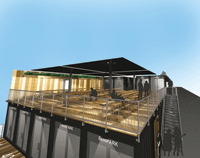
There is more to property than bricks and mortar. Brand is becoming increasingly important, particularly in the world of retail, which is why Dubai-based Meeras Holdings has received some rather angry letters from UK propcos recently.
Last week, the UK’s largest REIT, Land Securities, launched legal proceedings against Meeras for naming a $500m (£326m) UAE retail development Bluewaters.
LandSec is part owner of one of the UK’s best-known shopping centres, Bluewater in Kent, and paid handsomely for the 1.8m sq ft mall, not only for its dominance and potential, but also for its brand recognition.
Roger Wade, owner of the iconic Boxpark in Shoreditch, E1, who turned old sea containers into a trendy pop-up shopping mall in the London hot spot, is also preparing a legal threat to Meeras.
He claims that Meeras’ version of the shipping container retail concept, which trades under the same name, is a “copycat” scheme.
Trademarks and brands like Bluewater and Boxpark have protection if registered in the UK, but that does not necessarily eapply globally.
The World Intellectual Property Organisation allows companies to register their trademarks abroad under the Madrid Protocol – a system that allows for a bundle of trademark registrations to be made across several countries in one go.
Unfortunately, the UAE is not signed up to the Madrid Protocol so is not one of the countries in the bundle. Instead it runs its own trademark system, which operates on a first-to-file basis similar to that of the UK.
This means being first is pivotal if a firm has international expansion plans. But this can be an expensive and time-consuming process, so businesses are often left to challenge retrospectively on the basis of moral and reputation.

Boxpark is only registered as a trademark in the UK; LandSec has a trademark for the Bluewater name in both the UK and the UAE. But, crucially, it does not have one for the similar but not exactly the same, Bluewaters. Meaning Meeras may win out under the first-to-file system.
Both UK owners will fight their battles on the ground of goodwill, arguing that the alleged copycat schemes could be detrimental to their businesses.
But the fight will not be an easy one, says Iain Connor, partner in the intellectual property department at law firm Pinsent Masons. If the trademarked name can be viewed as descriptive, it will be difficult to head off highly similar but not identical copies, because of the need to provide concrete evidence that a name has been used in bad faith.
“Primarily the mark you should be seeking to register is distinctive and not descriptive of the goods or services,” says Connor.
It could be argued that Bluewaters is an allusion to the sea, while Boxpark is descriptive of a park of boxes.
The outcome of the legal challenges is therefore uncertain, underlining the importance of being first.
Propcos should think early and carefully about the brand names they choose and what impact an overseas copy would have, says Connor.
“Without protection, you risk severe reputational harm both in financial and broader business terms,” he says. “Given the global first-come, first-served system, others can adopt your business without your permission.”
So, as the real estate industry cottons on to the importance of brand and the value that recognisable schemes can have, protection of names will becoming increasingly important. Property will become intellectual as well as physical.











